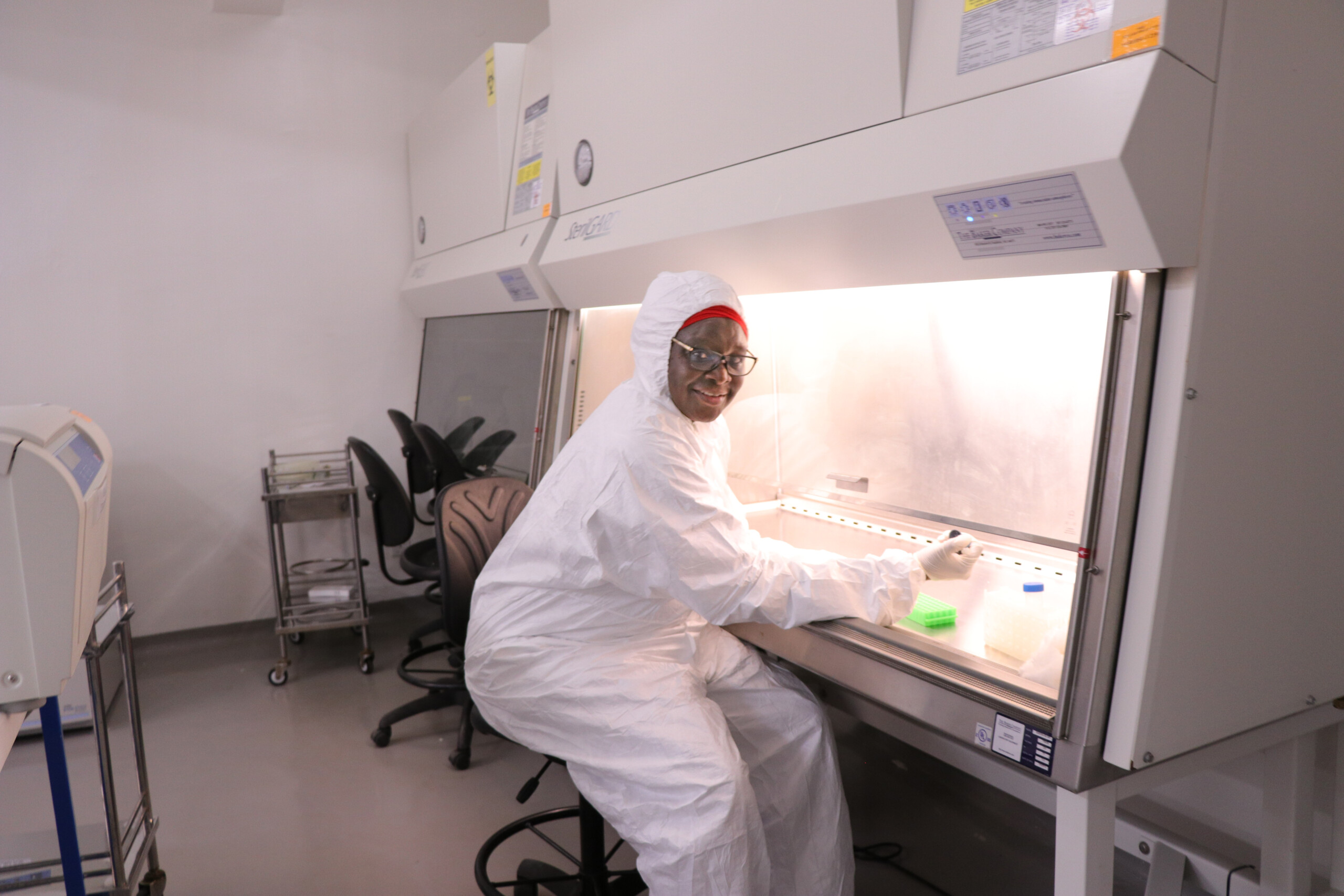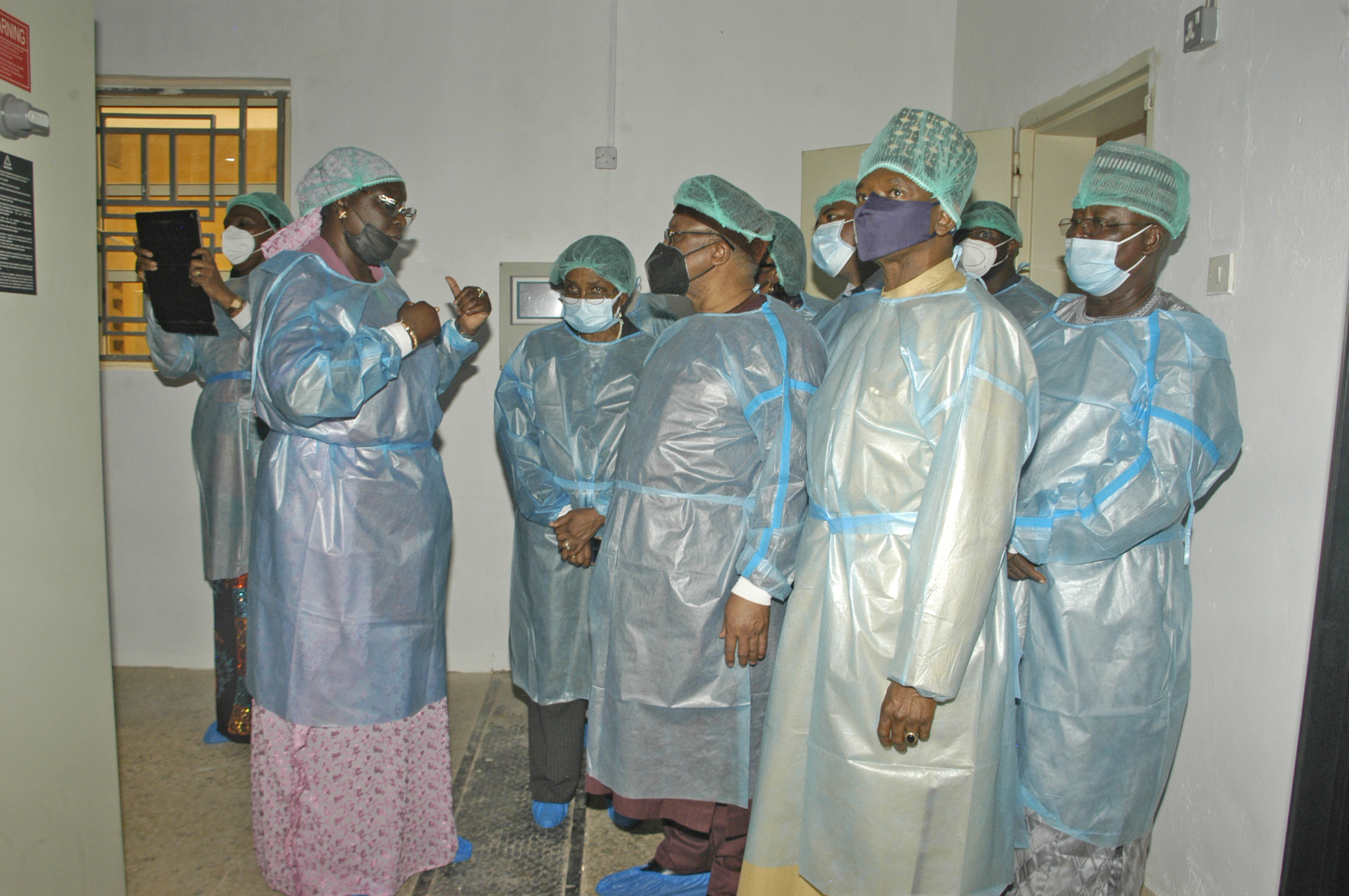Building on the recent success of WOAH’s first-ever World Café on Gender, which brought together representatives from various sectors to discuss the role of gender in the animal health and veterinary domains, WOAH’s Gender Task Force carried out an interview with one of the participants, Dr Maryam Muhammad. This interview is one of a series conducted with women in leadership positions kicked off at the WOAH 90th General Session.
WOAH is delighted to feature a second interview with Dr Maryam Muhammad, Director and CEO of the National Veterinary Research Institute in Vom, Nigeria, and a well-known and respected African veterinarian. Dr Muhammad brings important expertise and ideas to the table as WOAH delves into the critical topic of gender roles in the veterinary workforce.
Thanks to Dr Muhammad’s insightful perspective and learnings from other gender-related events and interviews, WOAH will work to support its Membership to achieve more inclusive and diverse working environments, promote gender-balanced leadership and push for equal opportunities in the animal health sector.
Dr Maryam Muhammed during a courtesy visit by the Ministry of Agriculture in Nigeria.
I am the Director and CEO of the National Veterinary Research Institute (NVRI) in Nigeria. By profession I am a veterinarian. I qualified many years ago. I have been in practice for almost 40 years… 38 years, I think. When I graduated in 1984, Nigeria had a policy of sending young graduates around the country. Young people would do one year of compulsory national service. That’s how I came to the Institute. I was a young veterinarian. After the first year, I was recruited by the Director of the Institute to be a member of the research staff. I have been there ever since. I rose through the ranks. In 2020, I was appointed as the CEO of the laboratory.
I think my leadership style is, one, inclusive, and secondly, I am a curious person. I like to explore, ask questions, and understand why people do what they do. Or what they would like us to do. I want to understand how we can help people develop as individuals.
Our Institute was established in 1924. We would like to help it move faster than it has in the past. My leadership style is to engage with everyone – researchers, social scientists, extension officers with people who go out and do field work, people working in the lab. I like to jump from one segment to another and understand what people are doing and how we can support them in their work.
When you progress and get into a directorate position, it becomes a combination of technical, administrative, and political work. For me this happened probably in the last ten years. In the last two years, as the CEO, a lot of the political and administrative work is on my shoulders. Sometimes it feels like a burden, but it’s also an adventure. It’s exciting! It’s an opportunity to learn. You are learning more about leadership, how to nurture, and how to mentor.
The Director of the Institute when I started there as a research staff was the pivot in my career. Not only did he recruit me, but he also took an interest in my career. He nurtured it – I don’t know what he saw, but he kept challenging me. First, I wasn’t sure about the job, but he encouraged me. He said, ‘come work for me’. I took it as a challenge. I was the first female veterinarian to be recruited by the Institute. He challenged me with work – writing papers, going in the field, working in the lab. He gave me the confidence to remain in the job. And to pick up whatever challenge I was faced with.
Dr Maryam Muhammed - Director and CEO, National Veterinary Research Institute, Nigeria
Throughout my career that’s one thing I have always done. I have always emphasised the importance of the next generation. I have had the opportunity to be a mentor, particularly for young women. But it’s also important for the young men that you see have a future in the Veterinary Services. They need to be pulled up and given the impetus to continue to advance their careers. With women particularly, I am deliberate about giving them a chance – to get further education, to get more training, to apply for new positions. I give them confidence to stay in the job – or to come back. For women who have to go away to have children, I do everything I can to help them use the government mechanisms to help them come back.
The Government helps women in the workforce, in the sense you get three months paid maternity leave. But once that’s over, you’re expected to come back full-time into work. It’s difficult – you have a three-month-old baby – and in Nigeria most of us breastfeed our kids. As a woman, and having had children myself at a young age, we try to work around these challenges and make sure that young women have opportunity. I had family support. But not all women have that. So usually what we do [in the Institute] is provide advice and support. What we are trying to do now is to establish a creche [daycare centre] at the Institute, so women can bring their babies and have them closer to their work.
Then, post-maternity leave, the women finish earlier than the men. They finish two hours early for six months. I make sure these policies are enforced – wherever the government gives the chance, so women can combine having a career and having a family. We also support leaves of absence so women can come back after they have their children.
When I started, I was the only female veterinarian. I noticed my colleagues would always want to give me what they thought was the easier job. For example, going to the poultry farm and not to work with large animals; wildlife work so you don’t have to travel so far. I didn’t receive it well – and then I had my mentor, who encouraged me to take up any challenge.
Now things are changing – there are much higher numbers of women veterinarians. You can go to the lab, do field work, research. Wherever you think you have the most strengths, we will support you. The gender differences are changing. So don’t limit us because we are women – let us choose what we want to do. It should be our choice.
I personally am deliberate in making sure we nominate women to grow their skills; to have further education and training and access to different career paths. Not to the disadvantage of men, but I am conscious of the fact that men find it easier to come out and say ‘I would like to do this’. Women are not as competitive – we might not come out and say we want to lead. So, we need to be more proactive to support those colleagues. Saying things like ‘I think it’s time for you to go back to school, I will nominate you.’ I don’t know how it is in the West, but in Nigeria women are not always “out there” – they don’t always push for things.
When I went to interview for this role, there were only men on the panel. One of them said to me, more or less, ‘how dare you.’ He said, ‘do you really think you can perform in this role as a woman?’. I said yes. I think the question for him was, given my background and culture, why would I think that I could lead men. So usually, women would not want to put themselves in that position. I felt that this particular person was asking this question because he was trying to provoke me, and then he would be able to say, ‘women are too sensitive, they get too upset.’
I did not fall for that trap; when they found I wouldn’t take the bait, this behaviour changed. You find that a lot of women are afraid of being challenged in that way. Even I, when thinking about applying for the job, I was thinking about it for a very long time. It was other colleagues that said to me ‘you can do this.’ Whilst I was thinking about it and wondering, there are one or two who said to me, ‘go for it, you can do it’.
You have to recognise that you need to build women’s confidence. Particularly in the Veterinary Services. For us, it is still seen as a very masculine profession. So many things happened in my career that now I look back and laugh about. When I started the sign on my door said, ‘M. Mohamed’, and people would come to the office, open the door, and say: ‘I’m looking for him’.
I think as an institution there are three areas WOAH can help: first, supporting with education. Second, providing a network of people who will provide mentorship, and also boost women’s confidence from early on in their careers. The PVS Pathway provides an opportunity, it provides national governments with the bigger picture. You can use that to identify young women and men who want to grow in their careers. Finally, WOAH could support with keeping people in Veterinary Services. This could be by recommending to governments how they can enhance their Veterinary Services to support people who want to work in the service. Or coming from the private sector, whether for men or women, provide them support to achieve their ambition within the Veterinary Services whether at community animal health level, professional veterinarian level. Generally supporting them to remain in the Veterinary Services.
We have been talking about the provision of Veterinary Services from the point of view of provider – we need to also look at the consumers – that’s the farmer, or the animal owner. Women professionals can play a role to support women throughout the value chain. They can support women to grow their businesses. What we find in our society is that the men get more support, e.g. bank loans, as poultry or livestock owners. In Nigeria, women and young people are the smallholder farmers. When you aggregate them, as a group they become more powerful.
You have to work twice as hard as men do, because everyone thinks you have been cut some kind of slack. Everyone’s attention is on you, as if they want to see you fail. It means you have to always have your guard up, and work double as hard, so you can prove that you are not getting this just because you’re a woman, but because you earned it. I don’t think it’s only in the Veterinary Services.


